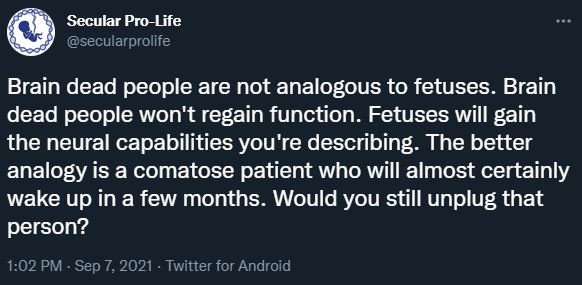Is personhood derived from past, present, or future consciousness?
Today’s post is by Andrew Scherer
I’ve thought a lot about what makes anyone a “person.” Perhaps “personhood” has only ever been a label that humanity has used as a linguistic gate-keeping device in order to justify oppression, cruelty, and the killing of people they do not like and want to eliminate. Can anyone else think of a scenario in which people have debated another’s personhood that didn’t involve justifying a violation of human rights?
At any rate, here is the best definition for “personhood” that I’ve been able to come up with:
Most people acknowledge that humans are bodies and minds (or consciousness), since when the mind dies, we pronounce the person dead. However, the truth must be that a person is a human body with an inherent capability for future consciousness. Let us test this standard:
Is personhood derived from past consciousness? If so, brain-dead people and dead bodies would still be persons. Corpses are not persons because they have no capability for present or future consciousness. Therefore, personhood cannot be derived from past consciousness.
Is personhood derived from present consciousness? If so, sleeping, unconscious, and comatose bodies would not be persons, and it would be acceptable to harm and kill them. If we accept that such bodies are still persons, then we can only conclude that personhood cannot be derived simply from present consciousness. There must be another element.
The only logical conclusion is that personhood is derived from the potential for future consciousness. This explains why a sleeping or unconscious body is a person. We know they will become conscious; therefore, they are persons. It also explains why a comatose person is protected so long as future consciousness is possible. Once doctors determine the body will never wake up, the person is pronounced dead. Therefore, the inherent capability for future consciousness is where personhood must be derived.
How does this standard apply to an unborn human? A zygote obviously has the inherent capability for future consciousness. In fact, future consciousness is guaranteed with natural growth (except in rare cases of abnormalities) unlike a comatose person whose future is often uncertain. Therefore, the only logical conclusion is that a zygote is a human person in its very first stage of development and killing it ends the life of a human person.
Why shouldn’t the standard be that a person is a living human body with a brain? Because that standard begs the question, “Why do we value the brain?” We value it because it is the source of consciousness. It’s specifically the capability for future consciousness that grants personhood and protections, not the brain itself.
We would therefore value whatever provides that inherent capability for future consciousness. For an unconscious or comatose person, the source of that future consciousness is the brain along with all of the biological functions and DNA instructions that allow for the brain to repair itself and resume consciousness. For an unborn fetus, it is the biological functions and DNA instructions that provide that inherent capability to develop a brain and keep it running. Either way, that inherently capability for future consciousness exists, and whatever the source is for that capability must therefore be where personhood is derived from.
Because both bodies have the inherent capability for future consciousness, adding the specification of “currently having a living brain” is unnecessary and arbitrary. It’s a distinction without a difference.
[Read more – Personhood based on human cognitive abilities]




Leave a Reply
Want to join the discussion?Feel free to contribute!